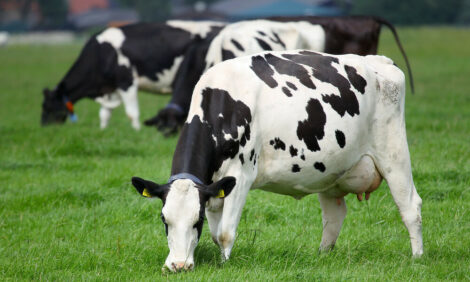



DairyCo ‘Research Day’ at Trenault Farm
UK - Nearly 100 people, including dairy farmers, vets, feed and breeding companies staff, last week attended a DairyCo ‘Research Day’ in Cornwall, showcasing some of its latest Research and Development, funded by levy.Mr Ray Keatinge, head of DairyCo research and development (R&D) said: “A continuous flow of R&D is crucial to increase the efficiency and overall competitiveness of the dairy industry.
"This is why DairyCo has been investing in R&D, including establishing two long-term Research Partnerships – one on Soils Forage and Grassland, and the other on Health Welfare and Nutrition.
"Within these consortia, DairyCo is now working with most of the leading UK universities and institutes involved in applied dairy research.”
Local DairyCo extension officer, Ms Becky Miles said: “This was the first ‘Research Day’ DairyCo has held on a commercial farm, previously they have been held on farms attached to research institutes.
"The host farmers, Geoff and Rhoda Heywood, have been involved in DairyCo discussion groups for a number of years - so we are pleased they agreed to help spread the word about the work DairyCo is doing.”
Geoff and Rhoda have been farming at Trenault Farm, Launceston for the past nine years and are making some significant changes to the direction of the business. The farm has been moving from a 9000 l spring calving Holstein herd grazed only during the daytime, to a split block cross-bred herd.
The aim is to reduce costs of production, through increased reliance on grazing.
At seven ‘stations’ across the farm, farmers could discuss technical issues and emerging research with expert researchers and DairyCo staff. Peers Davies from the University of Nottingham described his research into the mode of transmission, risk of infection and best measures to prevent Strep. uberis mastitis.
Mr Pete Down, also from Nottingham, discussed his work on the effectiveness of different control strategies used by farms adopting the DairyCo Mastitis Control Plan. Mr Andy Stokes, farm vet from Penbode Veterinary Practice, described the practical application of the Plan at Trenault.
Mr Paul Hargreaves (SRUC) and Ms Charlotte Evans (BGS)presented results from a four-year study on soil compaction. Experimental plots were compacted in the autumn either by trampling with cattle or by machinery, resulting in an average yield depression at first cut of 14 per cent and 22 per cent respectively.
Compaction was also found to negatively impact on water infiltration, soil structure and soil biology. Sward lifting and surface slitting are being used as remedial treatments, to assess improvements in soil structure and grass yield.
Ms Joanna Matthews (NIAB) and DairyCo extension officer Mr Piers Badnell presented new developments in grass variety selection – including the 2014 Grass and Clover Recommended List. Farmers were able to discuss reseeding techniques, and how best to manipulate the characteristics of different grass varieties to suit their requirements.
Trial work funded in collaboration with EBLEX, suggested that ranking of varieties did not change significantly when tests were conducted under nitrogen levels varying from 100 kg to 400 kg per hectare.
Dr Debbie McConnell, DairyCo research and development manager and Mr Andy Dodd, DairyCo technical extension, officer discussed the tools available for genetic improvement. This included the use of Herd Genetic Reports, as well as updates to £PLI (Profitable Lifetime Index), and the new £SCI (Spring Calving Index).
Ms Leigh Sullivan PhD student, University of Liverpool and Dr Jenny Gibbons, DairyCo research and development manager presented emerging research on Digital Dermatitis (DD), including confirmation that the DD organism could survive on hoof knives, as a further potential route of transmission.
Ms Karen Bond PhD student at the Royal Veterinary College, discussed practical approaches to tackling Johne’s Disease, including screening options, recently agreed by the Johne’s Action Group.
Ms Emily Hotchkiss of the Moredun Research Institute spoke about the routes of transmission and control strategies for Cryptosporidium, which appears to be an increasing problem on some dairy farms.
TheCattleSite News Desk


